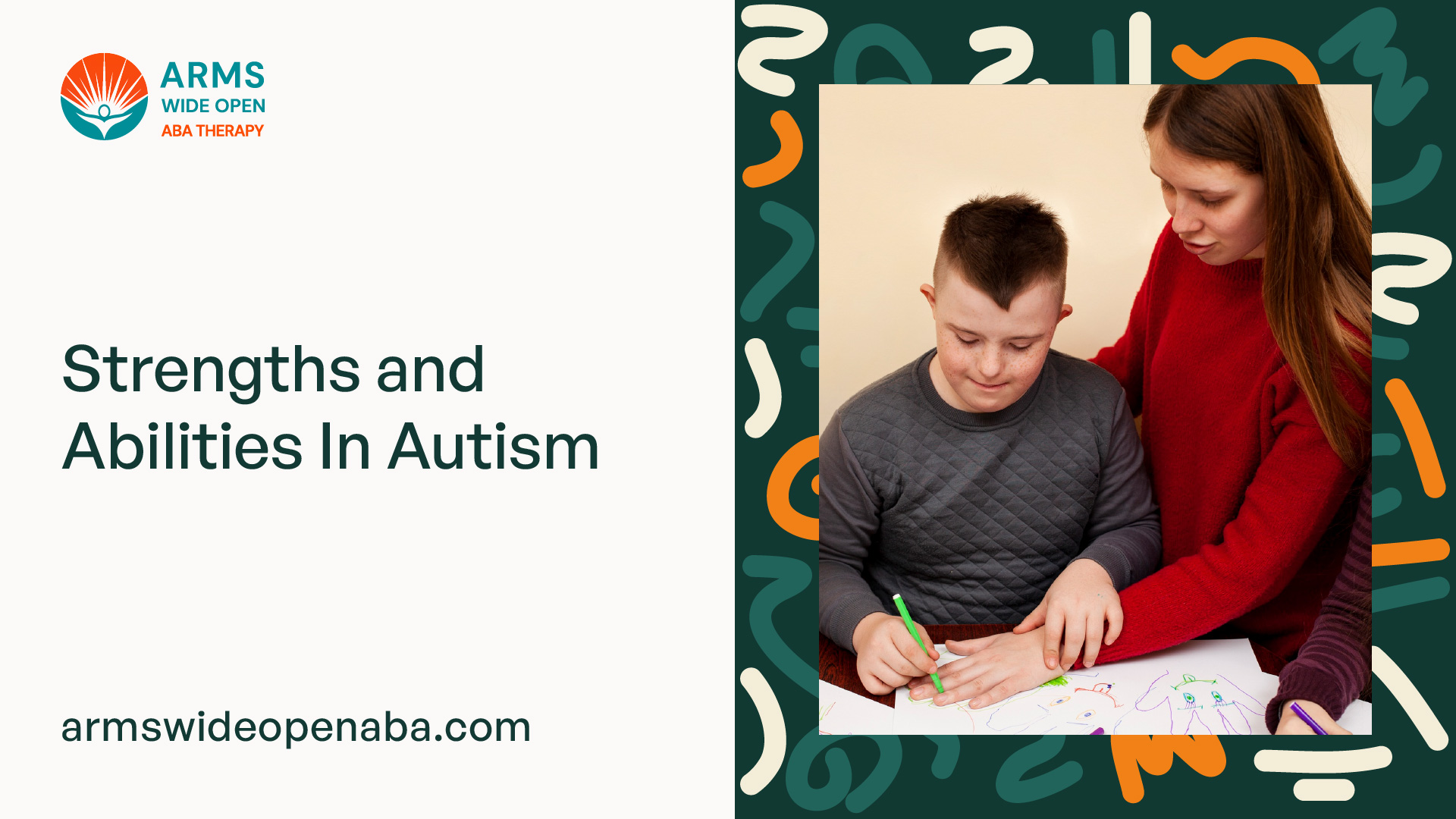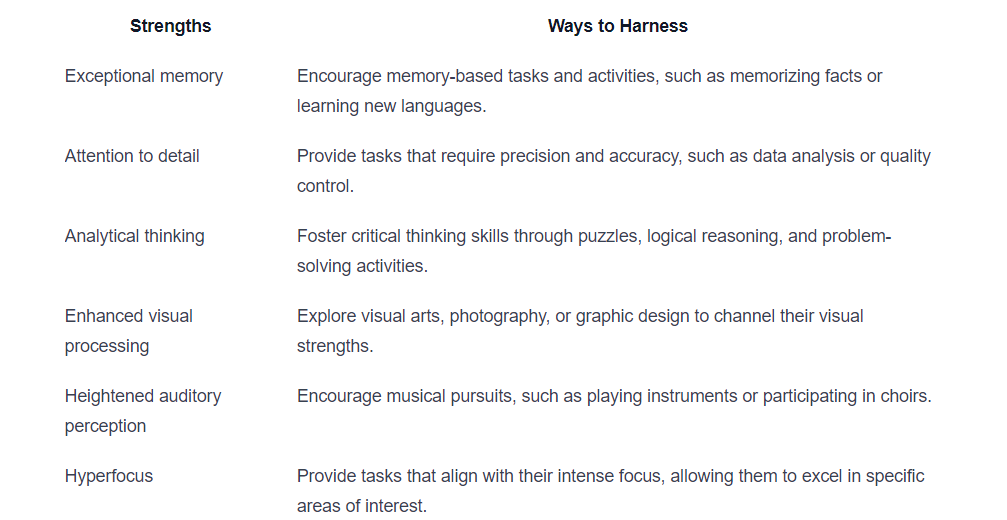Strengths and Abilities In Autism
Discover the strengths and abilities in autism, celebrating unique talents and fostering personal growth for success. Explore now!

Understanding Autism
To explore the strengths and abilities in autism, it is important to first understand what autism is and dispel common misconceptions surrounding it.

What is Autism?
Autism, or Autism Spectrum Disorder (ASD), is a neurodevelopmental disorder that affects individuals' social interaction, communication, and behavior. It is characterized by a range of challenges and strengths, making each person's experience unique. Autism is a lifelong condition, and its impact can vary from mild to severe.
Autism is not a disease or a result of poor parenting. It is a neurological difference that affects the way individuals perceive and interact with the world around them. While there is no known cure for autism, early intervention, therapies, and support can greatly improve an individual's quality of life and help them reach their full potential.
Common Misconceptions
Misconceptions about autism are prevalent in society, often leading to misunderstandings and stigma. It is important to address these misconceptions to foster a more inclusive and accepting environment for individuals with autism.
One common misconception is that individuals with autism lack intelligence or abilities. In reality, individuals on the autism spectrum often possess unique strengths and talents. While they may face challenges in certain areas, they can excel in others. By recognizing and harnessing these strengths, individuals with autism can make significant contributions to various aspects of life.
Another misconception is that autism affects only children. Autism is a lifelong condition that continues into adulthood. As individuals with autism grow and develop, their strengths and abilities can evolve and be nurtured to support their personal growth and success.
By understanding what autism truly is and dispelling misconceptions, we can create a more inclusive society that celebrates the strengths and abilities of individuals on the autism spectrum. The next section will focus on recognizing and harnessing these unique talents to promote success and well-being.
Shifting the Focus: Strengths and Abilities
In understanding autism, it is crucial to shift the focus from deficits to strengths and abilities. By recognizing and harnessing the unique talents of individuals with autism, we can create a supportive environment that promotes their success and well-being.
Recognizing Unique Talents
Individuals with autism often possess a range of unique talents and abilities that set them apart. These talents can vary widely from person to person, highlighting the diversity within the autism spectrum. Recognizing and appreciating these talents is essential for fostering a positive and inclusive mindset.
Unique Talents
Exceptional artistic abilities
Advanced mathematical skills
Extraordinary musical aptitude
Profound attention to detail
Exceptional problem-solving abilities
Harnessing Strengths for Success
Once we recognize the unique talents of individuals with autism, it is important to harness these strengths to promote their success. By focusing on their abilities, we can provide opportunities for personal growth, independence, and achievement.

By embracing and harnessing the strengths and abilities of individuals with autism, we create an environment that supports their personal development and overall well-being. It is important to celebrate these unique talents and provide opportunities for individuals with autism to thrive and contribute their valuable skills to society.
Cognitive Strengths
Individuals with autism often possess unique cognitive strengths that can be harnessed and celebrated. These strengths contribute to their exceptional abilities in various areas. Let's explore some of the cognitive strengths commonly found in individuals with autism: exceptional memory, attention to detail, and analytical thinking.
Exceptional Memory
Many individuals with autism have an exceptional memory that allows them to retain and recall information with great accuracy. This cognitive strength can manifest in different ways, such as remembering specific details, facts, or even entire conversations from the past.
The exceptional memory of individuals with autism can be a valuable asset in various fields, including academics, research, and creative endeavors. Their ability to retain and retrieve information can lead to in-depth knowledge and expertise in specific subjects.
Attention to Detail
Attention to detail is another cognitive strength commonly observed in individuals with autism. They possess a heightened ability to focus on intricate details that others may overlook. This attention to detail enables them to perceive nuances and patterns that can be instrumental in problem-solving and analysis.
Individuals with autism often excel in tasks that require precision and accuracy. Their keen eye for detail can be valuable in fields such as art, design, engineering, and scientific research, where a meticulous approach is essential.
Analytical Thinking
Analytical thinking is a cognitive strength that individuals with autism frequently demonstrate. They possess the ability to break down complex problems into smaller components, analyze each part systematically, and draw logical conclusions.
This analytical thinking allows individuals with autism to excel in fields that require critical thinking, such as mathematics, computer programming, and scientific research. Their unique perspective and analytical approach can lead to innovative solutions and insights.
To further understand these cognitive strengths, let's take a look at the following table that highlights the cognitive strengths commonly found in individuals with autism:

Recognizing and nurturing these cognitive strengths in individuals with autism is essential for their personal growth and development. By creating an environment that supports and capitalizes on their unique abilities, we can empower individuals with autism to thrive and make valuable contributions to society.
Perceptual Strengths
Autism is characterized by a unique way of perceiving the world, and individuals on the autism spectrum often possess perceptual strengths that set them apart. These strengths include enhanced visual processing, heightened auditory perception, and the ability to hyperfocus.
Enhanced Visual Processing
Many individuals with autism have enhanced visual processing abilities, allowing them to notice and analyze details that others may overlook. This heightened visual perception can be advantageous in various domains, such as art, design, and engineering.

Heightened Auditory Perception
Individuals on the autism spectrum often have heightened auditory perception, meaning they can detect and process sounds with greater accuracy and sensitivity. This strength can be beneficial in fields such as music, sound engineering, and language development.

Hyperfocus
Hyperfocus is another perceptual strength commonly observed in individuals with autism. It refers to the ability to intensely focus on a specific task or topic for an extended period. This deep concentration can lead to exceptional attention to detail and productivity.

By recognizing and understanding these perceptual strengths in individuals with autism, we can create a supportive environment that nurtures and harnesses their unique abilities. Providing opportunities that align with their strengths can empower individuals on the autism spectrum to reach their full potential and contribute their valuable talents to society.
Emotional and Social Strengths
While autism is often associated with challenges in social interaction and emotional expression, individuals on the autism spectrum possess unique strengths and abilities that should be recognized and celebrated. In this section, we will explore some of the emotional and social strengths commonly found in individuals with autism.
Empathy and Compassion
Contrary to popular belief, individuals with autism can exhibit a strong sense of empathy and compassion. They may demonstrate a deep understanding of others' emotions and experiences, often showing genuine concern and support. Their unique perspective allows them to offer a different kind of empathy, one that is honest, non-judgmental, and deeply compassionate.
Honesty and Authenticity
Individuals with autism are known for their honesty and authenticity. They often have a strong moral compass and a commitment to truthfulness. Their straightforwardness can be refreshing and genuine, creating an environment of trust and openness. Their ability to see the world through a different lens allows for unique insights and perspectives.
Passionate Interests
Many individuals with autism have intense and passionate interests in specific subjects. These interests can range from art and music to science and technology. These focused interests often become areas of expertise, with individuals demonstrating exceptional knowledge and skill in their chosen field. These passions can serve as a source of motivation, fulfillment, and even potential career opportunities.
Passionate Interests
Art
Music
Science
Technology
History
Animals
Recognizing and nurturing these emotional and social strengths is essential for supporting individuals with autism. By creating an inclusive and accepting environment that celebrates their unique qualities, we can empower individuals on the autism spectrum to thrive and contribute their valuable insights and talents to society.
Nurturing and Supporting Strengths in Autism
To help individuals with autism thrive and reach their full potential, it is essential to create a supportive environment that recognizes and celebrates their unique strengths and abilities. By focusing on nurturing these strengths, we can encourage personal development and celebrate individuality.
Creating a Supportive Environment
Creating a supportive environment is crucial for individuals with autism to feel safe, understood, and valued. Here are some key strategies for fostering such an environment:
- Clear Communication: Using clear and concise language, visual supports, and structured routines can help individuals with autism feel more at ease and understand expectations.
- Sensory Considerations: Being mindful of sensory sensitivities and providing sensory-friendly spaces can alleviate anxiety and promote a sense of comfort and well-being.
- Positive Reinforcement: Utilizing positive reinforcement techniques, such as praise and rewards, can motivate individuals with autism and reinforce their strengths and achievements.
- Collaboration and Support: Collaborating with parents, caregivers, educators, and professionals can create a strong support network and ensure consistent strategies across different settings.
Encouraging Personal Development
Encouraging personal development is essential for individuals with autism to build confidence, independence, and resilience. Here are some ways to support their growth:
- Individualized Education: Tailoring educational programs and interventions to meet individual needs and strengths can foster a sense of achievement and promote learning.
- Skill Building: Offering opportunities for skill development in areas of interest or strength can enhance self-esteem and enable individuals with autism to explore their talents further.
- Transition Planning: Providing guidance and support for transitions, whether it be from school to work or from one life stage to another, can help individuals with autism navigate these changes successfully.
- Social Skills Training: Offering social skills training and opportunities for social interaction can assist individuals with autism in developing meaningful relationships and building strong social connections.
Celebrating Individuality
Celebrating individuality is vital in promoting acceptance and creating a society that appreciates the unique abilities and perspectives of individuals with autism. Here are some ways to celebrate their individuality:
- Strength Showcasing: Recognizing and highlighting the strengths and talents of individuals with autism can boost their self-confidence and promote a positive self-image.
- Inclusion and Acceptance: Encouraging inclusion and acceptance in schools, workplaces, and communities can foster a sense of belonging and reduce stigma associated with autism.
- Autism Advocacy: Supporting autism advocacy initiatives and raising awareness about the strengths and abilities of individuals with autism can promote a more inclusive society.
By creating a supportive environment, encouraging personal development, and celebrating individuality, we can nurture the strengths and abilities of individuals with autism. Through these efforts, we can empower them to embrace their unique talents and contribute meaningfully to the world around them.
Sources
https://www.ncbi.nlm.nih.gov/pmc/articles/PMC8992926/
https://www.altogetherautism.org.nz/strengths-and-abilities-in-autism/
https://behavioral-innovations.com/blog/strengths-abilities-children-with-autism/
Similar articles
We’re here to help you

Our team is here to assist you in this process. Contact us for any assistance.
it’s easy to apply
We Accept Most Insurances
Our in-network insurance partnerships make ABA therapy more accessible to families throughout our service areas.







Our Insurance Process
We'll request your insurance details to help us verify your plan's coverage for ABA therapy. Once we've received this information, we'll walk you through your benefits, including copayments, deductibles and out-of-pocket maximums, so you know what to expect in advance.
Our team will then handle the preauthorization and all the necessary paperwork.
.svg)





















.jpeg)


































.jpeg)




.jpeg)







.jpeg)











.jpeg)
















